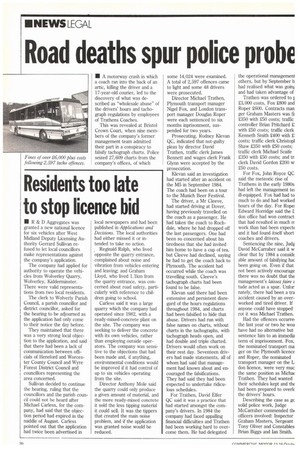Residents too late to stop licence bid
Page 18

If you've noticed an error in this article please click here to report it so we can fix it.
• R & D Aggregates was granted a new national licence for six vehicles after West Midland Deputy Licensing Authority Gerrard Sullivan refused to let local councillors make representations against the company's application.
The company had applied for authority to operate the vehicles from Wolverley Quarry, Woiverley, Kidderminster. There were valid representations from two local residents.
The clerk to Wolverly Parish Council, a parish councillor and district councillor, asked for the hearing to be adjourned as the application had only come to their notice the day before.
They maintained that there was a very strong local objection to the application, and said that there had been a lack of communication between officials of Hereford and Worcester County Council and Wyre Forest District Council and councillors representing the area concerned.
Sullivan decided to continue the hearing, ruling that the councillors and the parish council could not be heard after Michael Carless, for the company, had said that the objection period had expired in the middle of August. Carless pointed out that the application had twice been advertised in local newspapers and had been published in Applications and Decisions. The local authorities had either missed it or intended to take no action.
Reginald Ralph, who lived opposite the quarry entrance, complained about noise and vibration from vehicles entering and leaving; and Graham Lloyd, who lived 1.1km from the quarry entrance, was concerned about road safety, particularly with reference to children going to school.
Carless said it was a large quarry which the company had operated since 1982, with a ready-mixed-concrete plant on the site. The company was seeking to deliver the concrete with its own vehicles, rather than employing outside operators. The company was sensitive to the objections that had been made and, if anything, environmental conditions would be improved if it had control of up to six vehicles operating from the site.
Director Anthony Mole said the quarry could only produce a given amount of material, and the more ready-mixed concrete it sold the less tipping material it could sell. It was the tippers that created the main noise problem, and if the application was granted noise would be reduced.




















































































